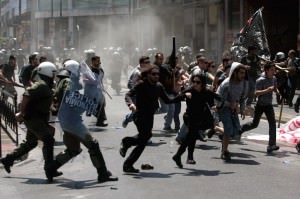Greece’s year of tumult
2010 has been an abysmal year for Greece, thanks in part to a heavy reliance on European Union subsidies.
by Peter Demain
Arbitrage Partner Blog
Dirty Garnet
Decades before the global recession, the Greek economy was Europe’s post-war success story. Growth soared with the nation becoming an attractive prospect for those in the chemicals and shipping industry, as well as proving an affordable tourist destination.
Despite stumbling in the 1980s, the economy appeared to be performing well. It was boosted in 2004 by the Athens Summer Olympics and was meeting the economic requirements of adopting the Euro currency.
But in 2009, the Panhellenic Socialist movement (PASOK) took power. It realized that the government deficit as reported by those previously in office was far lower than in reality: the old estimate of 6 to 8 percent GDP roughly doubled to 15.4%.
As these revelatory revisions went public, Thomas Mayer, chief economist at Deutsche Bank, expressed a comparison to elements of the USA sub-prime crisis: “They borrowed money on an economy with almost no manufacturing base, one that lives off tourism and agriculture. They have been living beyond their means.”
Both S&P and Moody’s downgraded the Greek investment rating when the sheer debt became evident. Investor confidence in the nation fell sharply. Events in themselves proved an unhappy portent for a nation so dependent on tourism and a relaxed image.
Throughout 2010 Greece has seen intermittent violent protest. Unemployment has soared yet higher through the year, with the rate at 11.8% this September, well over 2% higher than when the year began. Many took refuge in the education but impending reforms here angered students present who likewise have taken to the streets.
A BBC journalist in Athens described the scenes in mid-December as some of the ugliest yet. Fires were started, and a crowd mobbed an ex-government minister, who was photographed at the scene bleeding heavily. Cries of “Thieves! Shame on you!” were showered upon the politician and his entourage.
Corruption and poor policymaking certainly played a part in beginning the grinding rut Greece finds itself in. The perception that the government had window dressed so many signs of collapse for years is held strongly by protestors.
The International Monetary Fund and EU together bailed out Greece to the tune of $146 billion, with the deal finalized last May. In Spring certain publications, such as the Economist tentatively predicted stability in the debt-wracked nation. The renewal of violence even before the year is out apparently brings such sunny predictions to doubt.
What now? Like it or not Greece must rein in spending drastically. Without reserves of cash saved in the good times to draw upon a Keynesian style approach to recession spending is not viable – the short-term ‘crisis bailout’ is insufficient as a prop-up beyond the short term. Sacrifice therefore seems inevitable.
Unfortunately this is unlikely to appease the Greek citizens, who view the cuts as a butchering of public institutions the taxpayer has funded since these services were formed. Odds on Greece ever paying off its debts is low and the chance of a second round of bailout money from internationally funded sources likewise.
|
by Peter Demain
Arbitrage Partner Blog
Dirty Garnet
In association with:
The ARB Team
Arbitrage Magazine
Liked this post? Why not buy the ARB team a beer? Just click an ad or

































Share the post "Greece’s year of tumult"